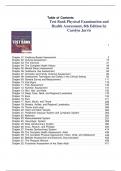Exam (elaborations)
Test Bank Physical Examination and Health Assessment, 8th Edition by Carolyn Jarvis
- Course
- Institution
- Book
Chapter 01: Evidence-Based Assessment Chapter 02: Cultural Assessment Chapter 03: The Interview Chapter 04: The Complete Health History Chapter 05: Mental Status Assessment Chapter 06: Substance Use Assessment Chapter 07: Domestic and Family Violence Assessment Chapter 08: Assessment Techniq...
[Show more]



